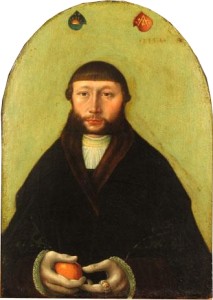Study course “Networking Europe: Art and Cultural History of the Hanse”
Bart Holterman, 9 November 2015
In September 2015 I took part in the study course “Networking Europe: Kunst- und Kulturgeschichte der Hanse”, organised by the Warburghaus, University of Hamburg. The course, led by Profs. Barbara Welzel (University of Dortmund) and Iris Wenderholm (University of Hamburg), offered the ten participants, predominantly PhD students in art history, a platform to present their research and to discuss methodological questions.

Hans Kemmer, Portrait of the merchant Hans Sonnenschein (1534), St. Annen Museum, Lübeck. Photo: Wikimedia Commons.
The course started with a visit to the opening of the exhibition “Lübeck 1500: Kunstmetropole im Ostseeraum” in the Museumquartier St. Annen in Lübeck. The exhibition highlighted the central role of Lübeck in the late Middle Ages as a centre for the production and trade of (religious) art. It presented an extraordinary and impressive overview of this period, with many loans from museums abroad.
The historical perspective was assumed with a subsequent visit to the newly opened European Hanse Museum (Europäisches Hansemuseum), through which we were guided by Prof. Rolf Hammel-Kiesow, the museum’s scientific leader. The museum provides a fascinating overview of the history of the Hanse in different environments (e.g., the mouth of the river Neva, where the Novgorod traders assembled, the market of Bruges, etc.) which submerge the visitor in the time of the Hanse, while supporting this with copies of archival documents and other sources.
Both museums gave an extraordinary overview of different historical aspects of the town Lübeck, but I missed the connection between the two a bit. In the Lübeck 1500-exhibition, only little was said about Lübeck as a hanseatic trade centre, the very reason for it´s being also a centre for the arts, while in my opinion the Hansemuseum focused too much on the written sources. Therefore, in the following days in Hamburg, we discussed intensively questions of interdisciplinary research, its flaws and advantages, and the role of (art historical) museums today. These discussions were very interesting, also in light of our current project, and were for me the main added value of my participation in this course.
Posted in: Reports
Comments